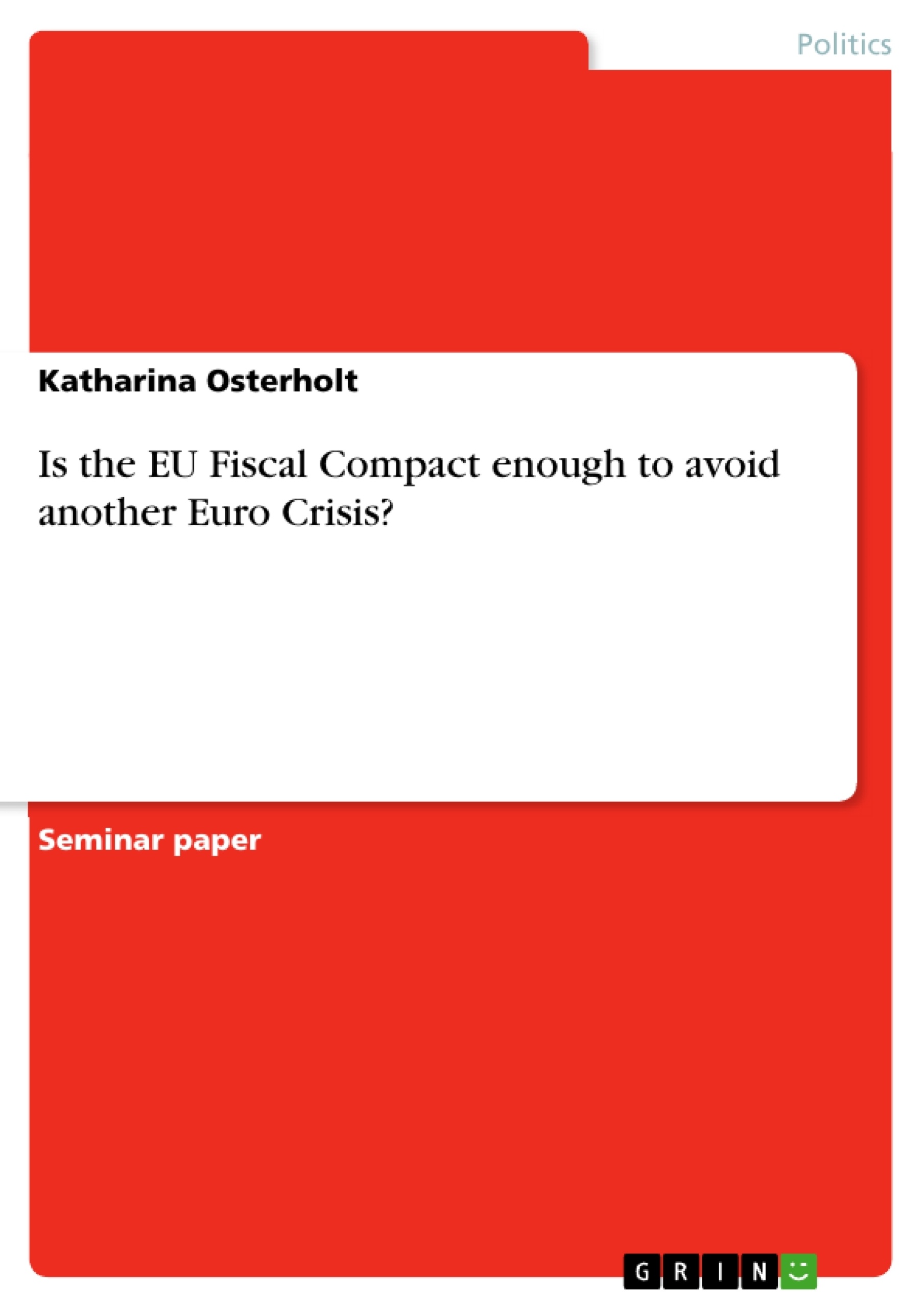This paper investigates the evolvement of the Fiscal Compact out of the Maastricht stability criteria using liberal intergovernmentalism and economic theories and gives an outlook into a possible future.
The new Fiscal Pact includes an automatic mechanism that sets in directly when a member state reaches a high public debt or government deficit. Furthermore, the EU Court of Justice has the competence to punish countries that have breached the treaty.
This crisis has shown that the integration between the euro zone members states is increasing, especially due to the need of fiscal and economic surveillance. The liberal intergovernmentalist approach explains how the increasing cooperation between the member states results into more enforcing supranational rules but also on why the EU might still be considered as a weak institution. This paper focuses on the underlying economic problems and how the euro member states seem to be able to cope with the crisis. It shows how the Stability and Growth Pact in the Maastricht treaty has not been enough and that due to the crisis, economic and fiscal integration as well as enforceable rules are getting more important and are leading to a stronger integrated monetary union.
Inhaltsverzeichnis (Table of Contents)
- INTRODUCTION.
- BACKGROUND
- Membership criteria to enter the EMU.
- Fiscal Compact.
- RESEARCH QUESTION
- THEORY
- LIBERAL INTERGOVERNMENTALISM.
- SPILLOVER EFFECTS.
- ECONOMIC SHOCKS
- METHODOLOGY.
- ANALYSIS.
- CONCLUSION
Zielsetzung und Themenschwerpunkte (Objectives and Key Themes)
This paper examines the evolution of the Fiscal Compact, stemming from the Maastricht stability criteria, using liberal intergovernmentalism and economic theories, and provides an outlook into a potential future. The paper analyzes the interplay between member states in shaping the Fiscal Compact, highlighting the increasing integration within the Eurozone and the complex dynamics of fiscal and economic surveillance.
- The Fiscal Compact and its evolution from the Maastricht stability criteria.
- The role of liberal intergovernmentalism in understanding the Fiscal Compact.
- The impact of economic shocks on the Eurozone and the need for fiscal and economic coordination.
- The increasing integration of the Eurozone in response to the economic crisis.
- The potential future of the Eurozone and the effectiveness of the Fiscal Compact.
Zusammenfassung der Kapitel (Chapter Summaries)
- Introduction: This chapter introduces the ongoing Eurozone crisis, highlighting the troubled situations of Greece, Portugal, Ireland, and Spain. It sets the stage for the investigation of the Fiscal Compact as a response to the crisis and its impact on the stability of the Eurozone.
- Background: This section delves into the membership criteria for entering the European Monetary Union, as defined by the Maastricht Treaty. It examines the five criteria, including inflation rates, long-term interest rates, ERM membership, budget deficit, and public debt, which aim to stabilize the currency. The chapter emphasizes the importance of these criteria and their role in the Stability and Growth Pact.
- Fiscal Compact: This chapter introduces the Fiscal Compact or Treaty on Stability, Coordination and Governance, signed in 2012. It details the key features of the treaty, including its focus on balancing national budgets, the implementation of automatic correction mechanisms, and the role of the EU Court of Justice in enforcing penalties. It also discusses the implications of the treaty on fiscal rules and economic policy coordination within the Eurozone.
Schlüsselwörter (Keywords)
The paper focuses on the Fiscal Compact, Eurozone crisis, Maastricht stability criteria, liberal intergovernmentalism, economic shocks, fiscal and economic coordination, integration of the Eurozone, and the potential future of the Eurozone.
Frequently Asked Questions
What is the EU Fiscal Compact?
The Fiscal Compact is a 2012 treaty aimed at strengthening fiscal discipline in the Eurozone through balanced budget rules and automatic correction mechanisms.
How does the Fiscal Compact relate to the Maastricht criteria?
It evolved from the original Maastricht stability criteria, making rules on debt and deficits more enforceable and introducing stricter surveillance than the original pact.
What role does the EU Court of Justice play in the Fiscal Compact?
The Court has the competence to verify if member states have correctly implemented the "debt brake" rules and can impose financial penalties for breaches.
What is "Liberal Intergovernmentalism" in this context?
It is a theory used to explain how cooperation between member states leads to stronger supranational rules while maintaining the states' primary role in decision-making.
Is the Fiscal Compact enough to prevent a new Euro crisis?
While it increases integration and fiscal coordination, the effectiveness depends on political will and the ability of member states to handle asymmetrical economic shocks.
- Quote paper
- Katharina Osterholt (Author), 2012, Is the EU Fiscal Compact enough to avoid another Euro Crisis?, Munich, GRIN Verlag, https://www.grin.com/document/193727



